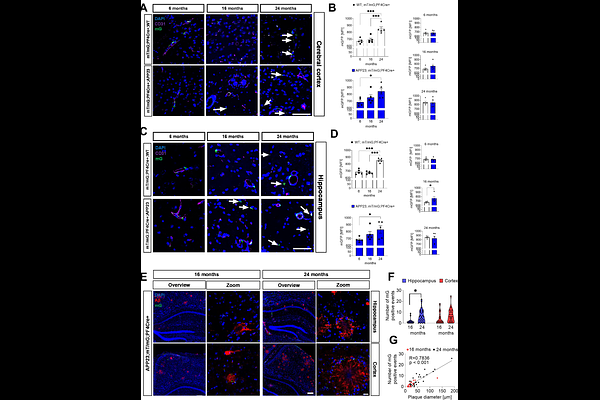Long-term antiplatelet therapy protects against cerebral but not parenchymal amyloid plaque formation and neurodegeneration in transgenic mice of Alzheimers disease

Long-term antiplatelet therapy protects against cerebral but not parenchymal amyloid plaque formation and neurodegeneration in transgenic mice of Alzheimers disease
Donner, L.; Toska, L. M.; Pils, M.; Rehn, F.; Bannach, O.; Elvers, M.
AbstractIntroduction: Cerebral amyloid angiopathy (CAA) is characterized by the aggregation of amyloid-{beta} peptides in cerebral blood vessels, leading to a loss of vascular integrity and contributing to the progression of Alzheimer\'s disease (AD). In our previous study, we showed that short-term treatment with the antiplatelet drug clopidogrel, a P2Y12 inhibitor that irreversibly blocks ADP signaling, reduced the incidence of CAA in the APP23 mouse model of Alzheimer\'s disease providing strong evidence for platelets to contribute to AD pathology. The objective of the present study was to ascertain whether long-term treatment with clopidogrel and the earlier initiation of treatment prior to the formation of A{beta} deposits prevents pathological changes associated with Alzheimer\'s disease. Methods: APP23 mice were treated with clopidogrel for 15 month and analyzed for AD pathology. Results: We detected increased permeability of the blood brain barrier in different brains regions of APP23 mice. Moreover, platelets migrated into the brain parenchyma and accumulated around amyloid plaques in the brain of APP23 mice. Although we detected platelets in close proximity to microglia and neurons in the cortex and hippocampus of APP23 mice, we did not observe any differences in neurodegeneration or gliosis in Clopidogrel treated APP23 mice. Furthermore, pathological analysis showed a significant reduction in CAA and in soluble A{beta}42 levels in the brain of Clopidogrel versus placebo treated APP23 mice but no differences in plaque load in the brain parenchyma. Conclusion: Thus, antiplatelet therapy may alleviate amyloid pathology in cerebral vessels leading to improved blood perfusion in AD patients.